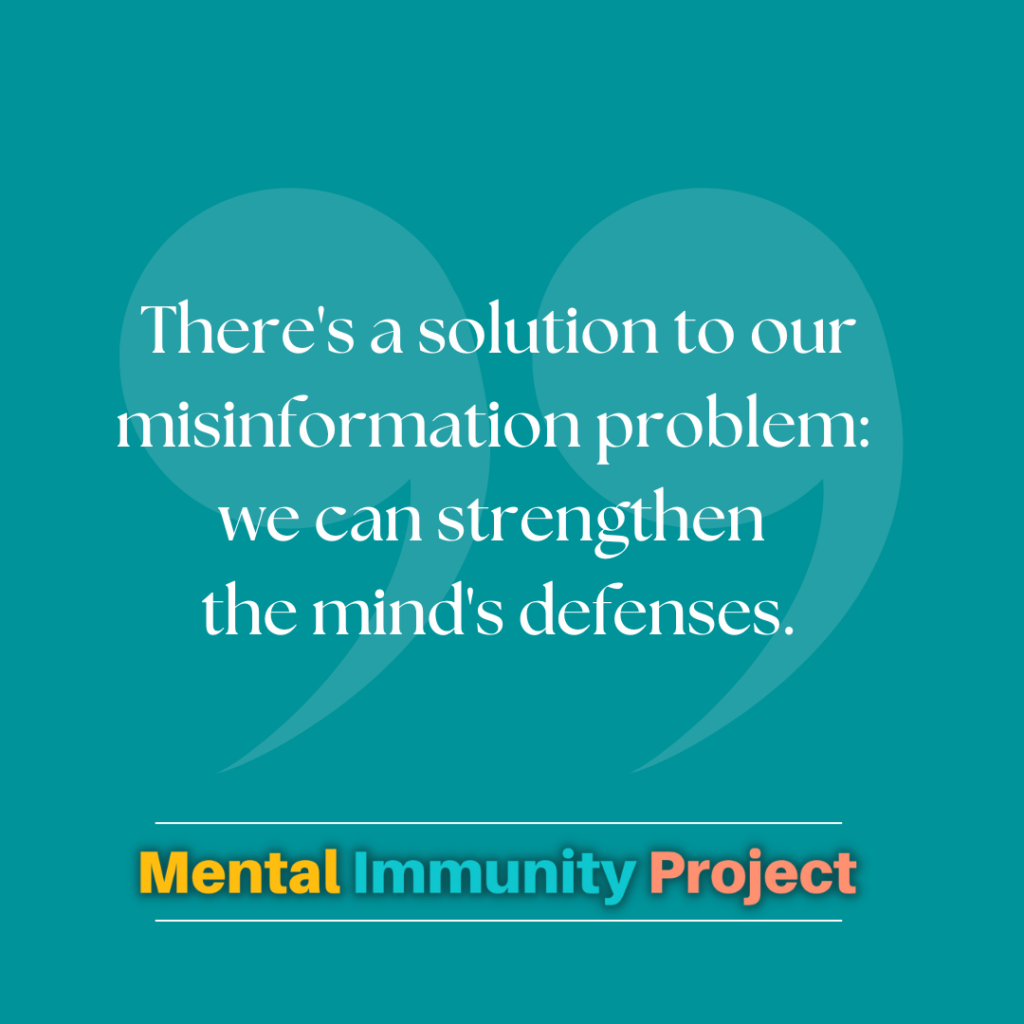Why Mental Immunity?
Our Infodemic Problem
We swim in a sea of information, much of it problematic. Fake news. Propaganda. Conspiracy theories. Pseudoscience. You get the point: there’s a lot of sketchy information out there.
And let’s be honest: it isn’t just “out there”; it’s also “in here.” Misconceptions work their way into our beliefs. Everyone’s beliefs. Yours and mine included.

Beliefs are both tricky and sticky. They’re tricky because, to the believer, they always feel true and right – even when they’re not. Put differently, we have a blind spot: we can see other people’s misguided beliefs, but rarely spot our own.
Beliefs are also sticky; over time, we grow attached to them. Then we reason defensively, in a misguided effort to protect them. That is, we rationalize rather than reason objectively. When culture wars break out, this tendency gets exaggerated: we feel threatened and reason in ultra-defensive (and sometimes ultra-partisan) ways. This dynamic has unhinged many minds.
Culture wars have destroyed magnificent civilizations. Even today, misinformation-driven partisanship tears at the social fabric.
Internet connectivity raises the stakes. In recent years, we’ve watched alternative facts spread like epidemics online. Scientists call outbreaks of misinformation “infodemics.” According to their models, bad ideas are like mind parasites and misconceptions are like mind infections. When others contract mind-infections, it’s often obvious; we’re almost perfectly blind, though, to our own.
So what’s a responsible person to do?
To solve this problem, we must understand how minds filter information. In the 1960s, scientists learned that our minds actively monitor for troublesome invaders, just as our bodies monitor for troublesome microbes. When they find information that looks like a threat, they generate doubts – just as bodily immune systems generate antibodies. Doubts then surround and try to neutralize the informational threat, just as antibodies surround and try to neutralize biological threats.

(One theory is that doubts actually are the antibodies of the mind!)
When they function properly, “mental immune systems” let in “good” information and screen out “bad” information. They aren’t perfect, of course: sometimes we’re too trusting and bad information (a falsehood, say) slips past the mind’s defenses. Other times we’re too skeptical and the mind’s defenses attack good information. This can lead us to deny the truth.
Some scientists are concluding that minds really do have immune systems. Others aren’t sure, but a broad consensus has emerged: we all need to develop our immunity to mis and disinformation.
Why? Because bad actors are using sophisticated digital tools to manipulate minds. Because false narratives spread like wildfire through social media. Because culture wars are breeding toxic ideologies. Because weaponized information is destabilizing democratic nations. It’s high time we took steps to mitigate our susceptibility.
Happily, we’re learning how to inoculate minds: expose a person to a weakened version of an informational threat, and often, they’ll learn how to spot similar threats. For example, if you have a group of children invent spoof conspiracy theories, they’ll learn how to spot and reject more noxious conspiracy theories.
So how do you protect people from scams and propaganda, toxic ideologies and debilitating misconceptions? The key to the whole thing is mental immune health. This site provides practical tools for understanding and building mental immunity.